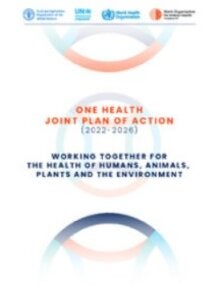ONE HEALTH - Action Track 5
Curbing the silent pandemic of antimicrobial resistance
Action track 5 “Curbing the silent pandemic of antimicrobial resistance” focuses on addressing the growing problem of antimicrobial resistance (AMR) in humans, animals, and the environment. The use of antimicrobials in humans and animals, along with environmental contamination, contributes to the emergence and spread of resistant microorganisms in multiple sources. Inadequate living conditions, limited access to clean water and sanitation, poor hygiene practices, and improper waste management further accelerate the development and dissemination of resistant genes and pathogens among humans, animals, and the environment. AMR has multiple drivers and needs to be tackled on many fronts, a One Health approach is essential to ensure that all sectors and stakeholders communicate and work effectively together. By implementing comprehensive strategies to address the AMR problem with a One Health vision, such as National AMR Action Plans, we can curb the emergence and spread of AMR.
Technical cooperation and country experiences
Initiative: Communities Empowered to tackle Antimicrobial Resistance
Empowering communities through social participation is central to effectively tackling the complex One Health challenge of AMR. As such, through the Empowered Communities against AMR initiative, that fosters an open and diverse dialogue on the role for AMR response, civil society groups and organizations as key stakeholders in the One Health AMR response. Regional dialogues between community and civil society members, non-governmental organizations, academics, representatives of governments and international organizations, took place to discuss tackling AMR. Through a powerful combination of poetry, music, presentations and discussions, this dialogue sought to capture, share, and learn from different community experiences with addressing the pandemic and collect relevant lessons for how to better engage communities and enable active participation to address AMR more effectively. The initiative was nominated and selected as a UN best practice in south-south cooperation for sustainable development.
Working Together to Fight Antimicrobial Resistance
During the four-year initiative (2020-2023) supported and financed by the European Union (EU), seven countries - Argentina, Brazil, Chile, Colombia, Paraguay, Peru, and Uruguay - received support for the implementation of their national action plans to combat antimicrobial resistance (AMR). The national action plans of these countries were at different stages of implementation, requiring a multisectoral situation analysis to identify gaps, opportunities, and necessary measures to strengthen implementation in alignment with the One Health approach. The initiative facilitated the establishment of relationships with global actors combating AMR, enabling the sharing of experiences, and advocating for the adoption of best practices in the use of antimicrobials in human health, animal health, and the agro-industry. Collaborative actions were promoted, including accessing knowledge on best practices from the European Union. As well as developing effective risk communication for raising awareness, promoting health, and providing training on AMR to diverse audiences.
Latin American and Caribbean Network for Antimicrobial Resistance Surveillance - ReLAVRA+
The ReLAVRA+ network is currently one of the world's oldest and largest regional antimicrobial resistance (AMR) surveillance networks, that includes all countries of Latin America and the Caribbean. Each country is represented by a national reference laboratory (NRL) officially designated by the national authority. The network collects and reports aggregated data on antibiotic resistance annually, focusing on priority pathogen-drug combinations. Over the years, more than 750 laboratories within the region have reported approximately 2,633,000 isolates' antimicrobial susceptibility testing (AST) data to the ReLAVRA network. The data are then reported to the Pan American Health Organization (PAHO) through its country offices. The pathogen-drug combinations are determined through evidence-based consultations and take into account regional situational analyses, country needs, and capacities. Standardized reporting templates and guidelines ensure accurate and comparable data. Regular meetings are held among network members to exchange information and discuss the annual reports.
Good practices
- Support the development, implementation, and evaluation of National Action Plans against AMR in the Region, under the "One Health" approach.
- Build country capacity for the implementation of integrated One Health AMR surveillance, encompassing human health, animal health, and food safety through training and education programs that include the use of molecular techniques and advanced laboratory methods for AMR identification and characterization.
- Engage communities and civil society as key stakeholders in addressing AMR, fostering their active participation and contribution to AMR awareness-raising and containment actions.
- Promote open and diverse dialogue between governments, academia and civil society, on AMR to capture and learn from community experiences, facilitating knowledge sharing and best practice exchange from a One Health perspective.
- Promote collaboration with global actors combating AMR or supporting One Health to stress the need for enhanced collaboration and commitment to translate the One Health approach into policy action in the Region.
- Develop effective risk communication strategies for raising awareness about AMR and disseminating key messages about its impact on human, animal, and environmental health, aiming to enhance understanding and promote responsible actions.
- Strengthen research and innovation in One Health and AMR, exploring alternative approaches to antibiotics and supporting scientific advancements in the field.












